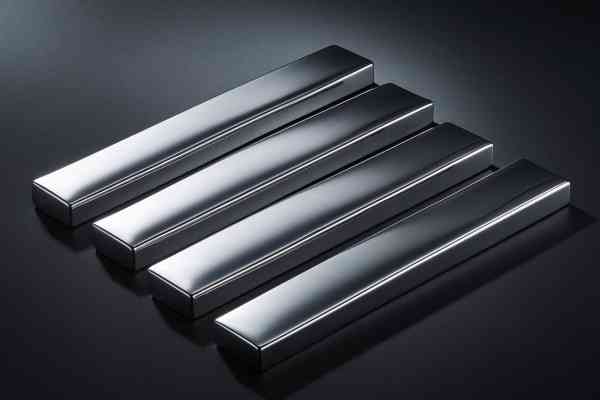May 21st, 2024 | 07:00 CEST
Lynas, Almonty Industries, General Motors - Is the trade war escalating, and what is Tesla doing?
The stock markets continue their record-breaking run. The Dow Jones Industrial has climbed to the 40,000-point mark for the first time in its history, and the DAX is also on the verge of breaking through the 19,000-point barrier. So far, so good, one might say. However, something is brewing in the background with regard to the trade war between the US and China, which could put enormous pressure on company margins in the future. As a result, critical commodities, in particular, are likely to be on the verge of a strong upward impulse.
time to read: 4 minutes
|
Author:
Stefan Feulner
ISIN:
LYNAS CORP. LTD | AU000000LYC6 , ALMONTY INDUSTRIES INC. | CA0203981034 , GENERAL MOTORS DL-_01 | US37045V1008
Table of contents:

"[...] While tungsten has always played an important role in the chip industry, it is now being added to batteries for e-cars. [...]" Lewis Black, CEO, Almonty Industries
Author
Stefan Feulner
The native Franconian has more than 20 years of stock exchange experience and a broadly diversified network.
He is passionate about analyzing a wide variety of business models and investigating new trends.
Tag cloud
Shares cloud
Biden increases pressure on China's electric vehicle industry
The campaign for the US presidential election in November has already begun, and the incumbent, Joe Biden, is doing everything he can to secure his second term in office. In the long term, the announced move to increase tariffs on all kinds of goods, from electric vehicles and solar cells to semiconductors and medical devices is likely to backfire.
After the news that the special tariffs on Chinese electric vehicles were to be increased from 25% to 100% was sent over the airwaves, the Middle Kingdom immediately threatened to take action. According to a statement from the Beijing Ministry of Commerce, it was said: "The US should immediately correct its wrong practices and cancel the additional tariffs imposed on China"... China will "take resolute measures to defend its own rights and interests."
In the short term, these measures will likely take effect and support the domestic US auto industry. In addition to market leader Tesla, which operates four gigafactories for the production of its electric vehicles in the US, US carmakers Ford and General Motors, which have been rated as "Overweight" by Morgan Stanley, are expected to benefit.
Raw materials as leverage
One trump card that the Chinese government could play in the trade war with the United States is the export ban on raw materials that are of strategic importance for the economic and military security of the West. The Middle Kingdom has a virtual monopoly on the value chain for rare earth metals, which are used as "technological spice metals" in catalytic converters, alloys, magnets, solar systems and computers. Alongside other raw materials such as cobalt, lithium and tungsten, rare earths are fundamental to the future of the energy transition. Without these materials, fully electric vehicles, batteries and networked Industry 4.0 applications would simply not work today.
The situation is even more dramatic when you add a sector that has taken center stage since Russia's invasion of Ukraine. This is because the above-mentioned technologies are also critical in the defense industry in terms of building modern and networked high-tech armies.
The demand for rare earth metals is enormous. For example, an American Virginia-class submarine contains around 4 tons, while an F-35 fighter jet requires as much as 400 kg of this critical raw material. The Western world has been trying to reduce its dependency for years. Although the Mountain Pass mine in California and Australian Lynas mines are currently in operation, the value chain from mining to processing to refining and production of rare earth metals and alloys is still over 90% in China.
Almonty Industries - Relief from the West
The situation with tungsten is similarly dramatic to that of rare earths. Due to its ultra-hard and heat-resistant surfaces, tungsten is used as a flywheel, counterweight, or vibration damping in aviation, automotive, sports, and telecommunications technology. Well over 80% of tungsten is mined in China, creating a significant dependency.
However, with the reconstruction of its mine in South Korea, Almonty Industries is providing significant relief to the global market.
At full capacity, the Sangdong mine is expected to account for 30% of global supply outside China. Production is scheduled to start as early as the end of the current year, with annual production of 2.3 million tons of tungsten oxide, which is to be gradually increased to 4.8 million tons. The life of the mine is estimated at 90 years. For the first 15 years, there is also an off-take agreement with the Plansee Group, one of the world's leading tungsten suppliers, which secures Almonty Industries a cash flow of USD 590 million. The Plansee Group is also the largest single shareholder. Deutsche Rohstoff AG is also one of the shareholders.
In addition to South Korea, the Canadian company operates properties in Spain and Portugal. The figures for the first quarter reported that the Panasqueira mine in Portugal achieved a consistently positive EBITDA. Overall, the Canadians are continuing to clean up their balance sheet by converting long-term debt of over CAD 9 million into shares in the Company and bringing forward the maturity of further long-term debt of CAD 21.2 million to March 2027.
The closer we get to the completion of the construction work, the more interesting the commodity producer, which is valued at CAD 182.09 million, is likely to become. Almonty Industries is on track, as the drawdown of the KfW IPEX-Bank credit facility in the amount of USD 75.1 million is expected to take place on time and as planned, and the seventh and eighth drawdowns are planned shortly.
The trade war between the US and China is likely to reach a new level with the increase in tariffs on electric vehicles. China could respond with an export ban on rare earth metals and tungsten, which would likely benefit producers in the West. The start of production at the mine in South Korea by Almonty Industries should significantly reduce the dependency on China for tungsten as an asset.
Conflict of interest
Pursuant to §85 of the German Securities Trading Act (WpHG), we point out that Apaton Finance GmbH as well as partners, authors or employees of Apaton Finance GmbH (hereinafter referred to as "Relevant Persons") may hold shares or other financial instruments of the aforementioned companies in the future or may bet on rising or falling prices and thus a conflict of interest may arise in the future. The Relevant Persons reserve the right to buy or sell shares or other financial instruments of the Company at any time (hereinafter each a "Transaction"). Transactions may, under certain circumstances, influence the respective price of the shares or other financial instruments of the Company.
In addition, Apaton Finance GmbH is active in the context of the preparation and publication of the reporting in paid contractual relationships.
For this reason, there is a concrete conflict of interest.
The above information on existing conflicts of interest applies to all types and forms of publication used by Apaton Finance GmbH for publications on companies.
Risk notice
Apaton Finance GmbH offers editors, agencies and companies the opportunity to publish commentaries, interviews, summaries, news and the like on news.financial. These contents are exclusively for the information of the readers and do not represent any call to action or recommendations, neither explicitly nor implicitly they are to be understood as an assurance of possible price developments. The contents do not replace individual expert investment advice and do not constitute an offer to sell the discussed share(s) or other financial instruments, nor an invitation to buy or sell such.
The content is expressly not a financial analysis, but a journalistic or advertising text. Readers or users who make investment decisions or carry out transactions on the basis of the information provided here do so entirely at their own risk. No contractual relationship is established between Apaton Finance GmbH and its readers or the users of its offers, as our information only refers to the company and not to the investment decision of the reader or user.
The acquisition of financial instruments involves high risks, which can lead to the total loss of the invested capital. The information published by Apaton Finance GmbH and its authors is based on careful research. Nevertheless, no liability is assumed for financial losses or a content-related guarantee for the topicality, correctness, appropriateness and completeness of the content provided here. Please also note our Terms of use.




